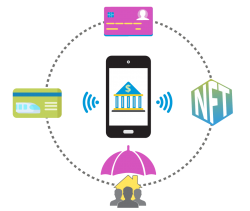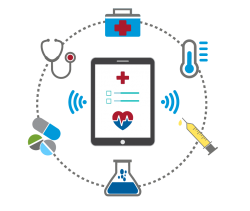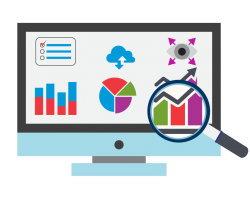The applications examined by the nine subject matter areas in the Business Method area are explained below.
Advertising, incentive programs, and coupons
Art Units: 3621A, 3621B, and 3622
The Advertising Workgroup examines applications for concepts calling to attention the interests of the public through advertisements to promote the exchange of goods and/or services. It also examines concepts that cover the determination of when and how to distribute the most effective type of advertisements, rewards, discounts, and incentives. The workgroup examines concepts covering complex technologies, algorithms, and protocols that drive improvements in the fields of targeted advertising and incentive effectiveness. Inventive concepts typically include mobile devices, networked computers, and electronic commerce arrangements that collect and process business data to offer customized incentives and more effective advertisements. The workgroup examines a wide range of subject matter which includes tools that are configured for targeting particular audiences or customers with personalized advertisements and arrangements for offering and effecting privacy protections, rewards, incentives, and discounts. The subject matter also includes methods and protocols that reduce friction during the redemption of incentives, support advertisement creation, and allow advertisers to tailor marketing and advertising campaigns.
Cost/price, reservations, shipping, and transportation
Art Units: 3628A, 3628B, and 3628C
The Transportation Workgroup examines computerized reservations systems that manage prior booking of reserved spaces. Mostly these pertain to travel (e.g., airline and hotel booking systems), but also include ticketing for seats at venues (e.g., concerts and sporting events). Other examples include reservations for vehicle charging parking spaces. The workgroup also examines data processing systems that arrange, manage, track, and facilitate payment for transporting people or goods without a prior reservation. These include both traditional taxi services and on-demand ridesharing, as well as shipment and delivery of packages and parcels via commercial carriers and national postal services. While much of the cost/price subject matter pertains to transportation (calculating transit or taxi fares, highway tolls, parking fees, postage metering, etc.), the workgroup also examines specific cost/price algorithms that determine charges to customers for some non-transportation goods and services (e.g., utility usage).
Cryptography and business data security
Art Units: 3697, 3698, and 3699
The Cryptography Workgroup examines subject matter including cryptographic apparatus or methods adapted for use in the practice, administration, or management of an enterprise; the processing of financial data; or where a charge for goods or services is determined. The examined subject matter also includes business data subject to authentication, authorization, anonymization, or other security through techniques such as digital rights management, encryption, tokenization, biometrics, device profiling, localization, timing, risk or fraud assessment, distributed ledger transactions, cryptocurrency transactions, software licensing, and voting.
Electronic shopping (e-Shopping)
Art Units: 3688A, 3688B, and 3689
The e-Shopping Workgroup examines applications having inventive concepts focused on and supporting remote, electronic shopping activities (such as through websites or mobile apps). Inventions of these types typically include computer/server or computer/computer arrangements where a shopper can participate in remote browsing and/or purchasing activities through a network (e.g. the internet) or telephonic connection with the intention of investigating, locating, ordering, configuring or customizing, comparing, and/or receiving recommendations for items for sale or trade. The shopper can be located in the home or office (such as by using a desktop or laptop computer), mobile (such as by using a smartphone), or even within a brick-and-mortar store (such as by using an in-store kiosk or mobile device). The e-Shopping Workgroup examines a wide range of subject matter which includes a variety of trading protocols, algorithms, interfaces, and tools that are specially configured for remote, electronic browsing and/or purchasing purposes.
Finance, banking, and insurance
Art Units: 3691 - 3696
The Finance Workgroup examines applications in the area of financial technology, or "fintech." Subject matter includes technology implemented through individual and networked devices where the device or devices perform operations related to banking, lending, credit processing, investment analysis, investment portfolio management, trading exchanges, insurance rate setting, insurance claims processing, risk analysis, and digital exchanges of value.
Healthcare
Art Units: 3681 - 3687
The Healthcare Workgroup examines healthcare informatics that involve information communication technology (ICT) adapted for handling or processing of patient-related healthcare data such as clinical trials that are related to laboratory analysis. This workgroup's examiners review therapy and health improvement plans with prescriptions and medications for steering and monitoring patient compliance. This workgroup also examines the handling or processing of medical images and the management of healthcare resources and facilities such as managing hospital staff or surgery. In addition, this workgroup examines methods for computer-aided diagnosis, modelling of medical disorders, data mining using medical data, and facilitating communication between practitioners or patients such as for collaborative diagnosis, therapy or health monitoring.
Inventory, point-of-sale (POS), and accounting
Art Units: 3626A, 3626B, 3627A, and 3627B
The Inventory Management, Point-of-Sale, and Accounting Workgroup examines applications having inventive concepts focused on and supporting computerized arrangements for inventory or stock management related to establishing, maintaining, or updating a record of the sequence of processes involved in producing and distributing a commodity (e.g. order filling and procurement; monitoring position of all assets in an enclosure; stock level control). This includes arrangements for generating an itemized listing of the components (e.g., parts, supplies, and services) needed either totally or based on specific tasks in an organization. This workgroup examines computerized arrangements including mechanisms (such as point-of-sale terminals, electronic cash registers, or even vending machines serving as a point-of-sale) for effecting a transaction and determining the amount of a sale in a system network. Such mechanisms may include devices for handling cash, or debiting an account or prepaid card such as at a restaurant or other place of business. This workgroup also examines computerized arrangements for recording, analyzing, verifying, or reporting of funds or other quantitatively innumerable factors used in a business. This includes arrangements specifically for tax preparation or submission, time accounting (e.g. time and attendance, and monitoring billable hours), checkbook balancing, and bill preparation.
Miscellaneous
Art Units: 3629A and 3629B
The Miscellaneous Workgroup examines electrical apparatus and its corresponding methods that perform data processing operations, in which there is a significant change in the data or that perform calculations wherein the apparatus or method is uniquely designed for or utilized in the practice, administration, or management of an enterprise, or in the processing of financial data. Examples include methods and systems for enhancing child safety; automating correctional facilities; or creating and using energy credits derived from the construction industry while maintaining green certification.
This workgroup also examines methods related to collaborative creation of a product or a service; workflow collaboration or project management; legal service; fundraising management; business or product certification or verification; product, service, or business identity fraud; personal security, identity, or safety; business establishment or product rating or recommendation; and product recycling or disposal administration. While much of the subject matter pertains to methods for performing data processing operations, this workgroup also examines aspects of social networking, human resources and employment or hiring; education administration or guidance; education institution selection, admissions, or financial aid; and career enhancement or continuing education services.
Operations research
Art Units: 3623, 3624A, 3624B, 3625A, and 3625B
The Operations Research Workgroup examines computerized arrangements for applying systematic or scientific analysis, evaluation, or other problem-solving techniques to the operation of an enterprise to understand the operation, improve effectiveness, and guide decision-making or management. This workgroup also examines methods for the planning, organizing, directing, or controlling of an enterprise for the purpose of accomplishing a goal (e.g., determining supply management, planning and scheduling appointments for enterprise purposes, and planning and executing efficient deployment of a workforce).










